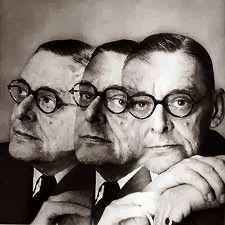An excellent parallel translation into English can be found at this link, but the German, as in Anne Sofie von Otter's rendition, below, is incomparable. My reaction on watching this video clip was jumping joy that humans are capable of such things – singer, song, orchestra, and filming - despite the failure it describes. It is especially moving, given Anne Sofie von Otter's special consciousness of the German World War II experience.
Children do see how upside down the world is. They take it all in on some level. I see that in old lynching photos, in which a crowd has killed a black person and you can see among the crowd the occasional face of a child, the face of a young white girl, who knows that true evil has been committed, that this is wrong. Such children definitely have my prayers go with them forever and ever.
Such a child has seen a lot by the time she is twenty. She can see it just in the way sensitive children are treated at school. I could see it as a child even in the way people drove their cars out of the church parking lot on Sunday mornings after having listened to all those fine Christian teachings about love. Or, take high school athletics heroes, and adults making a big deal over such heroes, throwing a ball through a hoop, when you know very well how admirable they are not: applause, names in the newspaper, jackets and letters, banquets, cheerleaders. You don't have to be a genius to see through all that, nor to see that the adults are pretending not to see what's actually going on. Albrecht Haushofer's Moabit Sonnet on the Olympics comes immediately to mind:

The resulting horror, the “death” in the piece, is surely what is behind so much youthful suicide, as well as parental grief and loss. I often found in discussing suicide in my teaching years in sociology that as many as half the students in a class had attempted suicide. The NIH reports that there are 13.1 attempted suicides for every single successful suicide, but I am certain that suicide statistics, defined and collected for adults by adults, are great underestimates as well as that suicide has other forms than just death of the body. Surely, much of what is currently called autism is a withdrawal from what a child is seeing, a sort of suicide.
Can you imagine what it's like for a child to witness a typical high school, never mind a lynching, and then being taken to a psychiatrist because it depresses you and you have thoughts of suicide, and then have the respected doctor start talking about transmitter neurons, serotonin, brain chemistry or electric shocks? It's asking a lot of a child, especially if she has never met a single other person who admits to seeing what she sees, nor has read a book by another person who sees what she sees. She is much more likely to hear something like “These are the best years of your life. Just wait until you grow up and have to support a family. Then you'll know what 'having a problem is.'”


